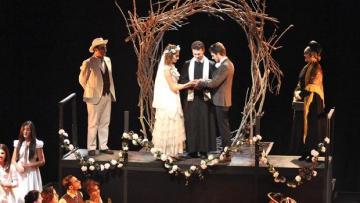Theatre is in their blood
TheatreBlood WeddingManoel Theatre The beauty of a well-crafted play lies in the poetry of its lines, coupled with the vision of its director in an exploration of human emotions and motivations in their rawest of states. The production of Federico...

Theatre
Blood Wedding
Manoel Theatre
The beauty of a well-crafted play lies in the poetry of its lines, coupled with the vision of its director in an exploration of human emotions and motivations in their rawest of states.
The indistinctness of time and setting implied that this panoply of passions could easily occur anywhere, at any time and in any place
The production of Federico García Lorca’s Blood Wedding last weekend was a veritable visual feast as seen through the tasteful eye of director Simone Spiteri.
The stunningly clever set, designed by Pierre Portelli, made the most of the play’s action by encouraging placement and movement, and it was enhanced by Chris Gatt’s lighting design.
The Tony Kline translation of García Lorca’s original script was given life in sound as well as motion thanks to the highly commendable choice of having indie-folk band Stalko play all the original, live music which was hauntingly beautiful.
The beauty of García Lorca’s writing does not lie in the complexity of the characters he creates – they tend to be representative of the many rather than the individual, as is evidenced by their lack of proper names; but in the universal truths that their journey represents.
Following an opening scene which combined elements of music and song with the rhythmic beating of knives, while a young girl, played by Maia Buttigieg, looked on, caught in the middle of an emotional tornado of love, lust, desire and revenge which she is too young to comprehend, the audience was transported to a rural Spanish village where the tragedy unfolds.
The indistinctness of the time and setting, which were more stylised than chronologically framed, implied that this panoply of passions could easily occur anywhere, at any time and in any place.
Josette Ciappara’s Mother was convincingly bitter and vengeful regarding the Felixes – the family who murdered her husband and eldest son – and her consequent protectiveness of her younger son, the Bridegroom, played by Dave Persiva, was understandable.
Ciappara’s interpretation was heartfelt and genuine, if at times betraying, a slight rhythmical deficiency – her concern was well perceived and comforted by Lizzie Eldridge’s Neighbour, who adeptly dished the gossip and soothed the soul. Persiva’s Bridegroom displayed the one weakness that men have when it comes to relationships – when they truly love, they love deeply and passionately and this is the one feature which he shares with Leonardo, the only named character here, played by a golden-voiced Chris Galea in top form.
As though memory and remembrance of things once possessed but long gone make us aware of their essence – to quote Julian Barnes “…memory is what we thought we’d forgotten” – Leonardo is remembered by name because he is what is missing in the Bride’s life.
Ruth Borg’s interpretation of the Bride came across as a woman of considerable strength, although the delivery of her lines could have done with better clarity. Her deep voice and controlled demeanour masked a vulnerability and underlying desire for her erstwhile lover, Leonardo, now trapped in a marriage with a loving wife – his original betrothed’s cousin, after having been rejected by the Bride.
This is a story of regret and passion, which leaves Leonardo’s wife, played sensitively by Chantelle Micallef Grimaud, grieving for a husband who has run off with the Bride on her wedding day, after she recognises her mistake in having let him go. The audience could feel true compassion for Grimaud’s heavily pregnant character as she struggles to keep up a good semblance of family life.
Meanwhile her mother, played by Ninette Micallef, rocks her eldest grandchild, in a powerful scene which made excellent use of a lighted tableaux box placed directly beneath the raised bridge which functioned as balcony, altar, promontory and more.
This same box later became the location where Toni Attard’s Death, who had been following the proceedings disguised as a beggar conversed with Marta Vella’s all-seeing Moon as she observes the two lovers’ flight. These two great character actors were in complete synch and skilfully portrayed the inevitability of the situation.
The Bridegroom’s disillusionment and his passionate anger at having been betrayed on his wedding day were well-crafted by Persiva, who set off, with his Bride’s Father, played ably by Charles Sammut, and accompanied by Karl Cassar and Joseph Zammit, who played multiple roles in the production from villagers and servants to priests and wedding guests. The same did Marie Keiser-Nielsen and Vee Stivala, who fleshed out a cast of secondary characters who functioned in a similar way to a Greek chorus.
A feisty Pia Zammit as the Maid brought some much-needed levity to the sense of foreboding which pervaded the run-up to the wedding and the Bride’s flight into the forest. This was an excellent scene and the originally conceived image where the tree trunks were evoked by means of strips of cloth which took root and were drawn up to the gods from the stage, took shape before the audience’s eyes.
This was akin to the wonderful wedding scene in which the SOPA Music Studio Choir, directed by Joseph Gatt, sang an a cappella Ave Maria to herald the nuptials, as the doomed couple were framed against the organic oval backdrop of branches on the raised platform.
Spiteri’s vision for this play is an outstanding example of what a young director can achieve. Over the past few years, her maturity as a director has gone from strength to strength, with Blood Wedding being the latest culmination: the entire performance was transformed into a comprehensive theatrical experience.
A big bravo to all.